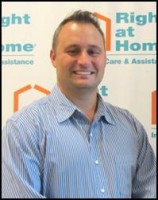Four Ways Primary Family Caregivers Can Manage Stress
First, Dad needed help monitoring his daily medications, and then he needed to be taken to physical therapy twice a week. During the next few months, Dad’s health continued to wane and he wrestled with losing his independence.
If you are a primary family caregiver, you understand the tough sacrifices and rewards of helping your elderly loved one maintain their independence. You are alongside them for the activities of daily living such as bathing, dressing and eating. You step in when there are medical and financial decisions to be made. You break the doctor’s news, you give the chin-up talks, you listen to the reminiscences of days gone by, and you love and are there without question.
Yet, like millions of other chief family caregivers, your life is expanding in scope and responsibility. If you juggle caregiving with your own family’s needs and a career, you sense the intense squeeze of time and commitments all the more. With your loved one’s care continually on the front burner, your care needs stay on the backburner. Without realizing it, your efforts to comfort and support your senior may be eroding your own health. Primary family caregivers are more susceptible to high blood pressure, stroke, diabetes and anxiety. Stress from caring for an aging loved one also can increase the likelihood of headaches, disruptive sleep and depression.
Primary family caregivers deserve a supportive round of applause because they work so tirelessly to serve their senior loved one, often without a break or even a “thank you.” Family caregivers, especially the main caregiver, are encouraged to take care of themselves regularly and not wait until they hit the frazzled and fatigued state.
Your aging loved one needs you functioning at your best, so relieving stress is vital to everyone’s health to manage day-to-day and long-term priorities.
The following stress busters are recommended for principal family caregivers:
Refresh your own health: Exercise at the gym or go for a brisk walk a few times a week. Be sure you maintain good nutrition and sleep habits. Check in with your own doctor on annual exams and ways to support your own optimal health.
Recruit help: Enlist the support of family members, friends and neighbors who can lend caregiving help. Also, rely on regular respite breaks through the assistance of a professional in-home caregiver. From getting help for a few hours a day to regular overnight care, securing adult home healthcare is a sign of wisdom and strength, not a sign of weakness or inability to care well.
Stay connected: Keep up your own family connections and friendships. Having a confidant who listens to you is crucial as you navigate the unknowns and challenges of caring for another person. Local or online caregiver support groups are another beneficial way to learn with others about realistic expectations and goals to prevent caregiver burnout.
Continue with your own life: To maintain balance, it’s important to stay active with your own interests, hobbies and social groups. Don’t skip the fun events or forgo your normal faith and community activities.
When primary family caregivers learn to relieve stress regularly – before health issues arise – they help safeguard their loved one’s care and preserve the relationship with their loved one – one shared meal, one doctor’s report and one fond memory at a time.
Lou Giampa is the President of Right at Home Westchester a provider of in-home care and assistance to seniors and the disabled. Lou is a New York State Certified Nurse Aide (CNA) who volunteers in hospitals and nursing homes throughout Westchester County. He also volunteers with the Alzheimer’s Association, Meals on Wheels, and the Aging in Place community. For more information call 914-468-1944 or visit www.westchesterseniorcare.com.

Examiner Media – Keeping you informed with professionally-reported local news, features, and sports coverage.

